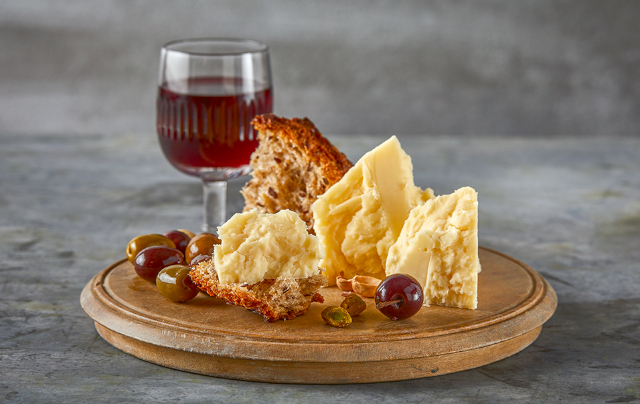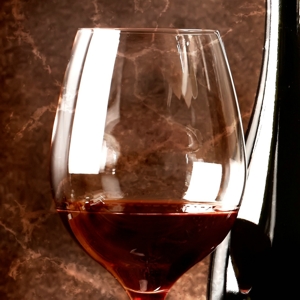Who says scientists and lab researchers are all white coats and no feather boas? Well, maybe not that big a contrast, but just in time for the year-end festive season, at least one lab team has published some truly good news for folks who love to indulge in good old fashioned party food…
 Red Wine pairs best (IMHO) with sharp cheeses, tart-sweet fruits (eg.- grapes, apples), earthy
Red Wine pairs best (IMHO) with sharp cheeses, tart-sweet fruits (eg.- grapes, apples), earthy
flavours (eg. – olives), cured and smoked specialties (ie.- Tapas in general). Small bites of
these concentrated flavours plus nicely calculated sips make memorable bites…
Scientific researchers are traditionally expected to turn their intellectual fire hoses on average folks’ fun just in time for Holiday Season festivities, with admonitions not to eat too much if this, or avoid that, usually for health reasons. Setting aside a dear friend’s theory that the white coats make such claims just at the crucial moment so there will be more goodies available for them, I postulate that most of the learned types are just looking out for our safety and well being. Thank you all, doctors, for your service. Now, on to the serious business…
The good news
I guess that’s one reason that results of a new study not only surprise me, but restore my faith in the fundamental humanity of the super-smart and logically-minded.
On the face of it, the rationale for the new study does not seem all that different than that for many other studies published throughout the year. In retrospect, I will concede that this observation may have resulted from the manner in which it was stated: The team wanted to see if they could identify connections, if any, between specific foods and later-in-life cognitive acuity. Which is fair, in as much as it was only after the data-mining exercise was complete that the vital conclusion become clear.
What they did
Researchers from Iowa State University, “analyzed data collected from 1,787 aging adults (from 46 to 77 years of age, at the completion of the study) in the United Kingdom through the UK Biobank, a large-scale biomedical database and research resource containing in-depth genetic and health information from half-a-million UK participants. […] Participants completed a Fluid Intelligence Test (FIT) as part of touchscreen questionnaire at baseline (compiled between 2006 and 2010) and then in two follow-up assessments (conducted from 2012 through 2013 and again between 2015 and 2016). The FIT analysis provides an in-time snapshot of an individual’s ability to ‘think on the fly’.”
According to an abstract of the study findings: “Participants also answered questions about their intake of fresh fruit, dried fruit, raw vegetables and salad, cooked vegetables, oily fish, lean fish, processed meat, poultry, beef, lamb, pork, cheese, bread, cereal, tea and coffee, beer and cider, red wine, white wine and champagne and liquor.”
What they found
The good news out of the study was clear in four of its major findings
- Cheese, by far, was shown to be the most protective food against age-related cognitive problems, even late into life;
- The daily consumption of alcohol, particularly red wine, was related to improvements in cognitive function;
- Weekly consumption of lamb, but not other red meats, was shown to improve long-term cognitive prowess; and
- Excessive consumption of salt is bad, but only individuals already at risk for Alzheimer’s Disease may need to watch their intake to avoid cognitive problems over time.
Principal Investigator Dr. Auriel Willette and Brandon Klinedinst, a Neuroscience PhD candidate at Iowa State stress that theirs is the first-of-its-kind large scale analysis that connects specific foods to later-in-life cognitive acuity and, so, bears special significance.
The takeaway
“I was pleasantly surprised that our results suggest that responsibly eating cheese and drinking red wine daily are not just good for helping us cope with our current COVID-19 pandemic, but perhaps also dealing with an increasingly complex world that never seems to slow down,” Willette said. “While we took into account whether this was just due to what well-off people eat and drink, randomized clinical trials are needed to determine if making easy changes in our diet could help our brains in significant ways.”
Klinedinst added, “Depending on the genetic factors you carry, some individuals seem to be more protected from the effects of Alzheimers, while other seem to be at greater risk. That said, I believe the right food choices can prevent the disease and cognitive decline altogether. Perhaps the silver bullet we’re looking for is upgrading how we eat. Knowing what that entails contributes to a better understanding of Alzheimer’s and putting this disease in a reverse trajectory.”
My take
I’m happy to agree with the team leaders in their principal findings. I just wish that they had found such clear and definitive benefits for White Wine as they did for Red, but that’s just a matter of personal preference. The overarching message is that, though we won’t be able to indulge in the usual year-end get-togethers hosted by our social and business connections this season due to re-instituted COVID-19 social distancing and isolation regulations, we can take heart in the knowledge that any micro-celebrations involving the universal cocktail nibbles – Wine and Cheese – have the potential to help us and not hurt us.
But that still doesn’t give us license to go nuts and overdo either Cheese or Wine this festive season. As so often is the case, my standing cautions apply: Moderation in all things, and common sense to all!
~ Maggie J.

